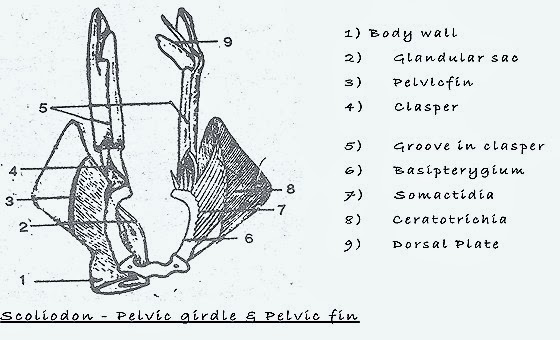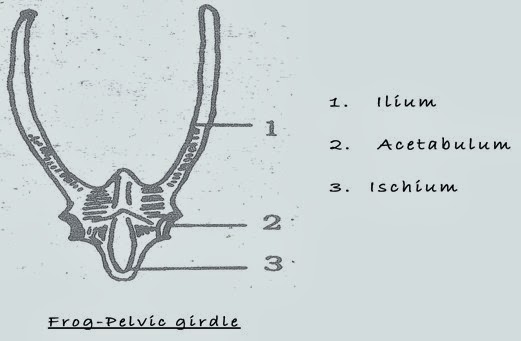FROG PELVIC LE GIRDLE- OF SHARK PELVIC GIRDLE-COMPARISON
The hip or pelvic girdle' is present in the posterior side of the body to which the pelvic fins or hind limbs are attached. The pelvic girdle is connected directly to the vertebral column in the sacral region. The pelvic girdle has two equal halves which are known as 'ossa innominata'. Each as innominatum is formed by three bones. They are the dorsal bone ilium, the ventral bone-ischium and the antero-ventral bone pubis. The pelvic girdle has a depression at the junction of the three bones. It is termed as acetabulum into which the head femur of the hind limb articulates and forms a ball and socket joint.
In the different vertebrates, the same bones are present in the pelvic girdle with some modifications.


| Shark (Scoliodon) | Frog (Rana) | |
| 1. The pelvic girdle is formed with cartilage tissues. | 1. The pelvic girdle is formed chiefly with bone tissues. | |
| 2. It is embeded in the body wall muscles infront of the cloacal aperture. | 2. It is present at the hind end of the trunk. | |
| 3. It is a simple transverse bar known as ischio - pubis bar. | 3. It consists of two similar halves which are separated infront and fused behind to form a median vertical disc. | |
| 4. Each half of the girdle is formed by the fusion of ilium ischium and pubis. | 4. Each half of the girdle consists of three bones - ilium, isclium and pubis. | |
| 5. Acetabulum is absent. | 5. Each side of the vertical disc bears a cup-like depression Acetabulum. The head of femur of the thigh bone articulates with the acetabulum. So all the three bones take part in the formation of the acetabulum. | |
| 6. The ilium possess an iliac process and a foramen. | 6. The ilium extends forwards in the form of an arm to articulate with the transverse process of the sacral vertebra. A vertical ridge is formed along with this arm is called iliac crest. | |
| 7. Ischium and pubis fused together and form Ischio-pubis bar. | 7. The ischium forms the posterior part of the disc and acetabulum. Ischium , fuses with the other side ischium and forms ischium symphysis. | |
| 8. Pubis fuses with ischium. It is not a separate bone. | 8. The pubis forms the ventral part of the disc and acetabulum. It fuses with the pubis of the other half and forms pubic symphysis. It is a separate bone. | |
| 9. Pubis is formed with cartilage tissue. | 9. Pubis is formed with calcified cartilage tissue. | |
| 10. The pelvic girdle is straight in the middle but bent at the ends. These are produced dorso-lat-erally into short iliac processes. | 10. The pelvic girdle V- shaped associated with a vertical disc formed with the ischium & pubis bones. | |
| 11. The pelvic fins are attached directly. | 11. The hind limb bones are articulating with the pelvic girdle.- | |
|
12. The pelvic girdle provides attachment to the claspers through the muscles of male.
|
12. Such arrangement is absent. Penis is absent. |
